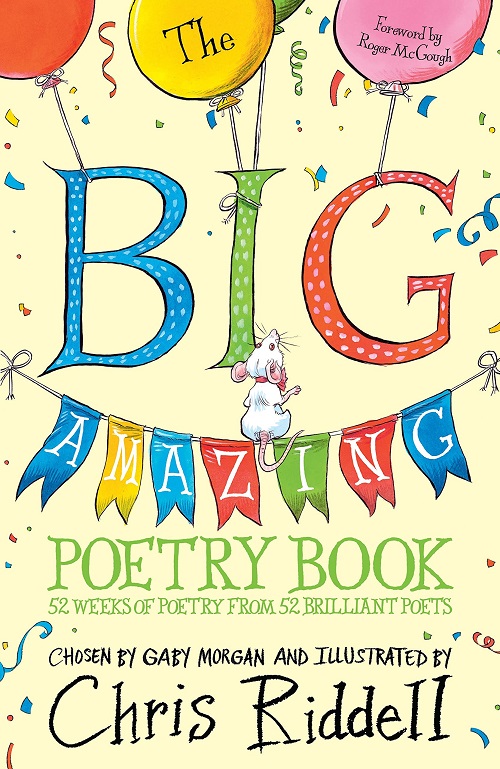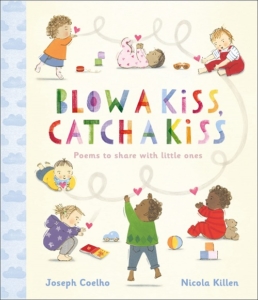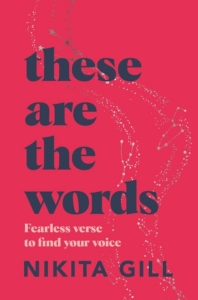
We Wish You a Merry Christmas: the best poetry for giving
‘It’s coming on Christmas, they’re cutting down trees’, so it must be time for a round- up of the new poetry for children published in 2022. Thanks to Clive Barnes for this selection.
Let’s start with two books with the same season appropriate title, We Wish You a Merry Christmas. For the youngest, there’s a suitably bright, jolly and glittery big board book from Floella Benjamin and illustrator Lydia Monks. Dame Floella is in Playschool mode as she leads the singing on the accompanying CD. Most of your favourite Christmas songs should be here, although sadly only the first verse. The exception is The Twelve Days of Christmas, where it would be definitely odd to stop on the first day. The Twelve Days also turns up in Chris Riddell’s wide-ranging collection for older children. There are a lot of classic poems alongside the carols and songs, and not just poets of the distant past, like Hardy and Wordsworth, but some much more recent: Benjamin Zephaniah’s wonderful Talking Turkeys; Adrian Mitchell’s Nothingmas Day; and Wendy Cope’s The Christmas Life, for instance. While Chris Riddell supplies the illustrations to his own collection, he has also been busy decorating The Big Amazing Poetry Book, a thumping bumper collection from Gaby Morgan subtitled ‘52 weeks of poetry from 52 brilliant poets’, reminding us that a poem is not just for Christmas. Each poet is given a short biography and allowed only seven poems. Long-time favourites like Brian Patten, Charles Causley and James Berry rub shoulders with newer voices like Jan Dean, A.F. Harrold and Kate Wakeling. They really are all brilliant and this is the sort of book I’d love to get for Christmas. It will certainly give weight to any stocking and if, in addition, you’re looking for something to pull the stocking out of shape in a beguiling picture book way, then P.J. Lynch’s lovely atmospheric rendering of Robert Frost’s mysterious Stopping by Woods on a Snowy Evening might be the book for you. Who better than Lynch to convey the poem’s mystery?
 Now, moving on ourselves, away from snow, presents and Christmas, let’s have a look at what other poetry has appeared this year. We’ll start with three titles for the youngest, all from our children’s laureate, Joseph Coelho: Poems Aloud, Smile Out Loud and Blow a Kiss, Catch a Kiss. The first two are illustrated by Daniel Gray Barnett and they’re good for providing material and encouragement for budding poetry performers young or old. But it’s the kissy book I like best. Illustrated by Nicola Killen, these are ‘poems to share with little ones’, and they demonstrate Coelho’s enviable gift of getting inside toddler lives, delivered with fun and tenderness. Coral Rumble’s Things that Should be in a Poem, for slightly older children, comes from the author of the award-winning Mustafa’s Jumper, which is included in the collection. These are poems of appealing simplicity, humour and musicality. Scared is Neal Zetter and Joshua Siegal’s second joint collection, and, while the usual scarey things like Vampires, Werewolves and Dinosaurs make their appearance, there’s space for more mundane horrors, like Gone Off Milk and the seriously scarey, Carbon Footprint, which looks at the real horrors awaiting us all if we don’t deal effectively with climate change. These collections come from seasoned poetry performers in schools, but not all poetry needs that kind of audience or response. Let’s Chase Stars Together from Matt Goodfellow, himself a former teacher, includes poems whose images and themes benefit from the close attention of the single reader to the page. There are poems here that are heartfelt and moving. A Thought, for instance, where a child watches his mum putting away her necklace at night, brings a lump to the throat in just three stanzas. Moving further up the age range, Ella Risbridger has put together a collection of ‘poems by women and girls’ entitled And Everything Will be Glad to See You. This has evidently been a labour of love and it’s given a production to match by publisher Nosy Crow. It’s in large gift book format, with stunning double page illustrations by Anna Shepeta, at a premium price. These are poems that sometimes express a distinctly female or feminist point of view, but needless to say, the collection is wide ranging and is for anyone who enjoys the poetry of, say, Grace Nichols, Carol Ann Duffy and Jackie Kay, to name but a few. And there are some cracking poems from names that I don’t so readily recognise. It certainly fulfils one of Ella Risbridger’s aims of ‘making sure that when someone asks you to think of a poet, you think of a woman, just as quickly as you think of a man.’ A rather thinner collection is Little Tiger’s Courage in a Poem featuring poems from a mainly young and ethnically diverse group of poets all exhorting us to be confident in ourselves; for, as Jason Reynolds hopefully reminds us in his poem A Talkin’-To, ‘everything bad and frightening and loud/will always hide when you hold your head up.’ Nikita Gill appears in both the last two collections and she has published a fine book of feminist poems of her own intended for young adults: These are the Words. Drawing on her experience as a young woman of colour, these are remarkable poems of rage,
Now, moving on ourselves, away from snow, presents and Christmas, let’s have a look at what other poetry has appeared this year. We’ll start with three titles for the youngest, all from our children’s laureate, Joseph Coelho: Poems Aloud, Smile Out Loud and Blow a Kiss, Catch a Kiss. The first two are illustrated by Daniel Gray Barnett and they’re good for providing material and encouragement for budding poetry performers young or old. But it’s the kissy book I like best. Illustrated by Nicola Killen, these are ‘poems to share with little ones’, and they demonstrate Coelho’s enviable gift of getting inside toddler lives, delivered with fun and tenderness. Coral Rumble’s Things that Should be in a Poem, for slightly older children, comes from the author of the award-winning Mustafa’s Jumper, which is included in the collection. These are poems of appealing simplicity, humour and musicality. Scared is Neal Zetter and Joshua Siegal’s second joint collection, and, while the usual scarey things like Vampires, Werewolves and Dinosaurs make their appearance, there’s space for more mundane horrors, like Gone Off Milk and the seriously scarey, Carbon Footprint, which looks at the real horrors awaiting us all if we don’t deal effectively with climate change. These collections come from seasoned poetry performers in schools, but not all poetry needs that kind of audience or response. Let’s Chase Stars Together from Matt Goodfellow, himself a former teacher, includes poems whose images and themes benefit from the close attention of the single reader to the page. There are poems here that are heartfelt and moving. A Thought, for instance, where a child watches his mum putting away her necklace at night, brings a lump to the throat in just three stanzas. Moving further up the age range, Ella Risbridger has put together a collection of ‘poems by women and girls’ entitled And Everything Will be Glad to See You. This has evidently been a labour of love and it’s given a production to match by publisher Nosy Crow. It’s in large gift book format, with stunning double page illustrations by Anna Shepeta, at a premium price. These are poems that sometimes express a distinctly female or feminist point of view, but needless to say, the collection is wide ranging and is for anyone who enjoys the poetry of, say, Grace Nichols, Carol Ann Duffy and Jackie Kay, to name but a few. And there are some cracking poems from names that I don’t so readily recognise. It certainly fulfils one of Ella Risbridger’s aims of ‘making sure that when someone asks you to think of a poet, you think of a woman, just as quickly as you think of a man.’ A rather thinner collection is Little Tiger’s Courage in a Poem featuring poems from a mainly young and ethnically diverse group of poets all exhorting us to be confident in ourselves; for, as Jason Reynolds hopefully reminds us in his poem A Talkin’-To, ‘everything bad and frightening and loud/will always hide when you hold your head up.’ Nikita Gill appears in both the last two collections and she has published a fine book of feminist poems of her own intended for young adults: These are the Words. Drawing on her experience as a young woman of colour, these are remarkable poems of rage,  consolation, solidarity, hope and love. I particularly like her witty reworking of newspaper astrology columns into soothing advice and reassurance, ‘Libra: if the world feels too heavy, remember, you can set it down’. Sophia Thakur, who appears alongside Nikita in Courage in a Poem, has her own collection too. Wearing My Mother’s Heart eloquently explores her own loves and losses and, in particular, her relationship with the female generations before her and their Christian faith. These are adult poems, I would say, but they speak as much to those who are on the edge of adulthood. In the topical But if the statues have to stay, she asks for a bench to rest the legs ‘of the two hundred and twenty thousand non-white staff members of the NHS’ – ‘Immortalize the sacrifice/not the one holding the knife. /To what we still give glory, history makes right.’ In Reframing, she asks, ‘Why use creativity to doubt/when you could instead use it to dream.’ This does not exhaust the year’s poetry. You might also like to look back at the reviews in this magazine of Valerie Bloom’s Stars with Flaming Tails (winner of the CLIPPA award for 2022); Where Do Wishes Go by Debra Bertulis; When Poems Fall from the Sky by Zaro Weil; and Razzmatazz, a ‘best of’ compilation of Roger Stevens poetry. Older readers might remember Roger McGough’s An Imaginary Menagerie, and John Hegley’s I am a Poetato, both republished this year.
consolation, solidarity, hope and love. I particularly like her witty reworking of newspaper astrology columns into soothing advice and reassurance, ‘Libra: if the world feels too heavy, remember, you can set it down’. Sophia Thakur, who appears alongside Nikita in Courage in a Poem, has her own collection too. Wearing My Mother’s Heart eloquently explores her own loves and losses and, in particular, her relationship with the female generations before her and their Christian faith. These are adult poems, I would say, but they speak as much to those who are on the edge of adulthood. In the topical But if the statues have to stay, she asks for a bench to rest the legs ‘of the two hundred and twenty thousand non-white staff members of the NHS’ – ‘Immortalize the sacrifice/not the one holding the knife. /To what we still give glory, history makes right.’ In Reframing, she asks, ‘Why use creativity to doubt/when you could instead use it to dream.’ This does not exhaust the year’s poetry. You might also like to look back at the reviews in this magazine of Valerie Bloom’s Stars with Flaming Tails (winner of the CLIPPA award for 2022); Where Do Wishes Go by Debra Bertulis; When Poems Fall from the Sky by Zaro Weil; and Razzmatazz, a ‘best of’ compilation of Roger Stevens poetry. Older readers might remember Roger McGough’s An Imaginary Menagerie, and John Hegley’s I am a Poetato, both republished this year.
Clive Barnes has retired from Southampton City where he was Principal Children’s Librarian and is now a freelance researcher.
All the collections mentioned are included in the BfK Christmas Gift Guide.





